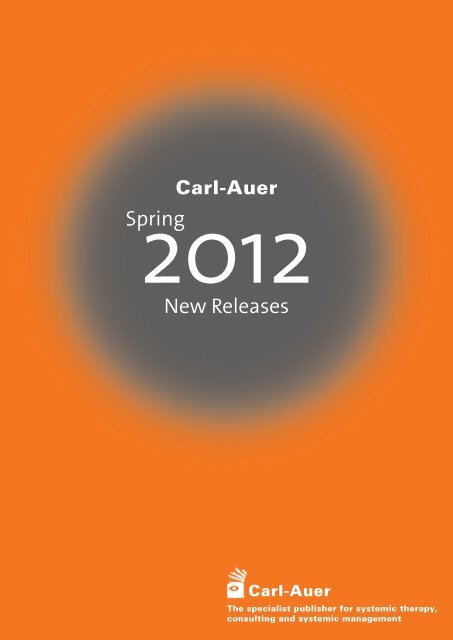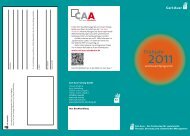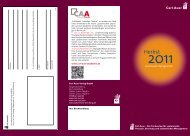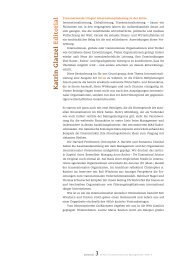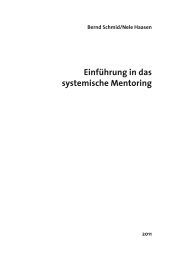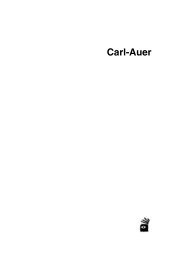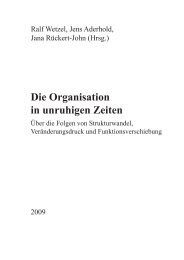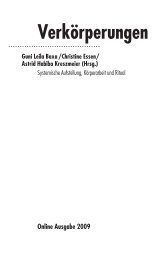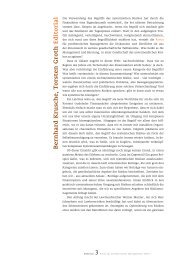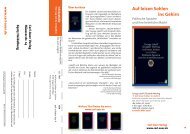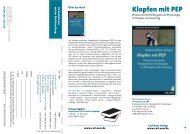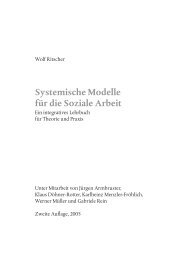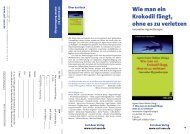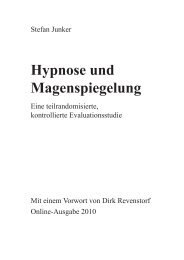Foreign Rights 2012
Foreign Rights 2012
Foreign Rights 2012
Create successful ePaper yourself
Turn your PDF publications into a flip-book with our unique Google optimized e-Paper software.
Carl-Auer<br />
Spring<br />
<strong>2012</strong><br />
New Releases<br />
Carl-Auer<br />
The specialist publisher for systemic therapy,<br />
consulting and systemic management
ADHD – so what?<br />
A book about the healing handling of<br />
active and highly perceptive children<br />
Carl-Auer-Systeme Verlag<br />
und Verlagsbuchhandlung GmbH<br />
Vangerowstr. 14<br />
69115 Heidelberg<br />
Germany<br />
Helmut Bonney<br />
ADHD – so what?<br />
A book about the healing<br />
handling of active and<br />
highly perceptive children<br />
139 pages, paperback, <strong>2012</strong><br />
€ (D) 16,95/€ (A) 17,50<br />
ISBN 978-3-89670-834-2<br />
“Attention-Deficit Hyperactivity Disorder” is a diagnosis,<br />
which nowadays is made quickly and more often.<br />
Not only is medication often times the only form of<br />
treatment but the condition is frequently misdiagnosed.<br />
In those cases in which the diagnosis is accurate, medications<br />
may alleviate some acute symptoms for a certain<br />
period of time but they do not cure the disorder.<br />
Also, possible side effects are rarely mentioned. But<br />
what are you supposed to do, if your environment urges<br />
you to seek treatment for your child and your physician<br />
is quick at reaching for his prescription pad?<br />
This book is written for parents and pedagogues who<br />
want to understand their child and the “disorder” and<br />
who seek an effective approach to deal with this difficult<br />
CARL-AUER<br />
Zest for Living<br />
Klaus W. Müller (<strong>Rights</strong> & Licenses)<br />
tel +49-6221-6438-16<br />
fax +49-6221-6438-22<br />
mueller@carl-auer.de<br />
www.carl-auer.de<br />
Carl-Auer Verlag<br />
Life Coaching<br />
and stressful situation. The child and adolescent<br />
psychiatrist Helmut Bonney views ADHD from another<br />
perspective than the norm: He regards “active and<br />
highly perceptive children” as being exposed to an environment<br />
in which they are required to process more and<br />
more information in less and less time.<br />
With the help of several case studies the author<br />
demonstrates the various therapeutic treatment possibilities<br />
when viewed from this perspective: for working<br />
exclusively with the child, for including the entire<br />
family or for the cooperation with the school. This book<br />
does not only provide knowledge to parents and pedagogues<br />
but also orientation and security of dealing with<br />
the child and its professional helpers.<br />
Helmut Bonney, MD, physician for pediatrics, child and adolescence psychiatrist and psychotherapist, specialist for<br />
psychotherapeutical medicine, systemic family therapist (SG). Private social-psychiatric practice for child and adolescence<br />
psychiatry; director of the systemic Seminar in Heidelberg. Publications on approaches of outpatient child<br />
and adolescence psychiatry and ADHD-questions: “Neues vom Zappelphilipp” (together with G. Hüther, 8th ed. 2007),<br />
“ADHS – Kritische Wissenschaft und therapeutische Kunst” (2008). [“News from the fidgety child” (together with G.<br />
Hüther, 8th ed. 2007), “ADHD – Critical science and therapeutic art” (2008).] Speaker and training activities in Germany,<br />
Austria and Switzerland.<br />
Following the motto “Life can be so easy”, Carl-Auer’s series ZEST FOR LIVING<br />
provides easily comprehensible systemic knowledge and a lot of information<br />
useful for your everyday life.
How to lead without dominating.<br />
29 rules for an intelligent leadership.<br />
Carl-Auer-Systeme Verlag<br />
und Verlagsbuchhandlung GmbH<br />
Vangerowstr. 14<br />
69115 Heidelberg<br />
Germany<br />
Rolf Arnold<br />
How to lead without dominating<br />
29 rules for an<br />
intelligent leadership<br />
158 pages, paperback, <strong>2012</strong><br />
€ (D) 17,95/€ (A) 18,50<br />
ISBN 978-3-89670-833-5<br />
Whether on your job, in an honorary position or anywhere<br />
else – when trying to “lead” people, you can<br />
quickly reach your limits – yours or those of other people.<br />
How do you overcome them? How can you claim<br />
leadership and at the same time achieve your goals in<br />
cooperation with others?<br />
By strengthening the momentum of groups, teams or<br />
organizations, intelligent leadership promotes contexts,<br />
it shapes relationships and creates “spirit”. Intelligent<br />
leaders rarely exercise their authority or even use<br />
instruments of power even if they are aware of them<br />
and their appliance. Intelligent leadership is (and<br />
remains) risky because whoever makes use of it does<br />
not operate in a world of if-then-certainties.<br />
CARL-AUER<br />
Zest for Living<br />
Klaus W. Müller (<strong>Rights</strong> & Licenses)<br />
tel +49-6221-6438-16<br />
fax +49-6221-6438-22<br />
mueller@carl-auer.de<br />
www.carl-auer.de<br />
Carl-Auer Verlag<br />
Life Coaching<br />
Rolf Arnold provides tools for the successful organization<br />
of “typical” leadership requirements. On the one<br />
hand he relies on the latest knowledge of leadership<br />
research and on the other hand on his extensive practical<br />
experience, which he gained in diverse management<br />
functions, as consultant and as supervisor of companies<br />
and organizations throughout the entire world during<br />
the last three decades.<br />
The author does not expect his readers to understand<br />
these 29 rules as recipes but as an appeal for self-reflection.<br />
Thereby, the last of the 29 rules is also indicative<br />
for the management style suggested by him: Mistrust<br />
rules and discover your own!<br />
Rolf Arnold, Ph. D., Professor of Pedagogy; scientific director of the Distance and Independent Studies Centre (DISC)<br />
at the Technical University of Kaiserslautern; systemic consultant on a national and an international basis (main<br />
focus: managers, education system development). Teaching at the Universities of Bern, Heidelberg and Klagenfurt<br />
and at the Pedagogical University of Luzern. Publications amongst others: “Aberglaube Disziplin” (2007), “Ich lerne,<br />
also bin ich” (2007), “Seit wann haben Sie das?” (2009), “Wie man ein Kind erzieht, ohne es zu tyrannisieren” (2011).<br />
[“Superstition discipline” (2007), “I’m learning, therefore I am” (2007), “Since when do you have this?” (2009), “How<br />
to raise a child without tyrannizing it” (2011).]<br />
Following the motto “Life can be so easy”, Carl-Auer’s series ZEST FOR LIVING<br />
provides easily comprehensible systemic knowledge and a lot of information<br />
useful for your everyday life.
Carl-Auer-Systeme Verlag<br />
und Verlagsbuchhandlung GmbH<br />
Vangerowstr. 14<br />
69115 Heidelberg<br />
Germany<br />
Introduction to campaigning<br />
Andreas Graf von Bernstorff<br />
Introduction to campaigning<br />
120 pages, 14 illustrations,<br />
22 photographs, paperback, <strong>2012</strong><br />
€ (D) 13,95/€ (A) 14,40<br />
ISBN 978-3-89670-831-1<br />
Look out of the window. If you are lucky, you will see a<br />
nice tree. It is supposed to be cut down. What are you<br />
going to do about that, who do you talk to first, and who<br />
gets to decide in the end?<br />
Modern campaigns are systematic interferences in<br />
politics, society or market development seeking sustainable<br />
change: Campaigning for Change. They do not<br />
want any revolutions or radical system changes for the<br />
sake of change but they try to modify the advised system<br />
with pictures and symbols for continuing change. With<br />
such a subversive campaigning current potentials are<br />
used tactically.<br />
Klaus W. Müller (<strong>Rights</strong> & Licenses)<br />
tel +49-6221-6438-16<br />
fax +49-6221-6438-22<br />
mueller@carl-auer.de<br />
www.carl-auer.de<br />
Management / Organisation Development<br />
In this introduction the former leader of international<br />
campaigns at the environmental protection organization<br />
Greenpeace provides tools for an optimal organization<br />
of campaigns. A set of criteria for the planning<br />
efforts – up to the final evaluation – and various exercises<br />
are complementary to the theoretical part of this<br />
book. Particularly impressive are the illustrated reports<br />
on exemplary campaigns which made history.<br />
Andreas Graf von Bernstorff is a cooperating partner at Heitger Consulting in Vienna and freelance consultant for<br />
campaigning and strategic communication. From 1989 to 2005 he organized international campaigns for Greenpeace.<br />
He is author of several publications on international environmental questions and questions on campaign<br />
strategies in general; he also gives lectures at the Universities of St. Gallen and Heidelberg, at the Humboldt-Viadrina<br />
School of Governance and at the AMAK-Kontext (University of Mittweida).<br />
Carl-Auer Verlag
Carl-Auer-Systeme Verlag<br />
und Verlagsbuchhandlung GmbH<br />
Vangerowstr. 14<br />
69115 Heidelberg<br />
Germany<br />
Klaus W. Müller (<strong>Rights</strong> & Licenses)<br />
tel +49-6221-6438-16<br />
fax +49-6221-6438-22<br />
mueller@carl-auer.de<br />
www.carl-auer.de<br />
Management / Organisation Development<br />
Introduction to the theory of family business<br />
Fritz B. Simon<br />
Introduction to the theory<br />
of family business<br />
126 pages, paperback, <strong>2012</strong><br />
€ (D) 13,95/€ (A) 14,40<br />
ISBN 978-3-89670-843-4<br />
Family businesses account for two thirds of all companies<br />
in Germany – there are more than 700,000 family<br />
enterprises in Germany. Despite their indisputable economic<br />
importance the relevant scientific disciplines<br />
such as business economics or sociology still do not offer<br />
any workable models to describe this special union of<br />
family and business.<br />
With this introduction, for the first time, Fritz B. Simon<br />
provides a comprehensible theory for anybody who<br />
practically and scientifically deals with family businesses,<br />
whether as a family member, as a member of such a<br />
family business, as a consultant or researcher.<br />
Based on the system and social theory characterized by<br />
Luhmann and on constructivism, family and business<br />
are described as social systems each with its own communication<br />
and dynamic, which, once enmeshed in a<br />
family business, present a series of paradoxes and double<br />
bonds to the parties involved. By those means it is<br />
possible to understand the systems’ rules, to manage<br />
the contradictions and to derive promising instructions.<br />
This book provides orientation for the daily management<br />
routine, for multigenerational family businesses,<br />
for dealing with conflicts and power struggles and not<br />
least for a successful succession.<br />
Fritz B. Simon, MD, Professor of Management and Organization at the Institute for Family Businesses at the University<br />
Witten/Herdecke. Systemic organizational consultant, psychiatrist, psychoanalyst and systemic family therapist.<br />
Co-founder of the “Management Zentrum Witten GmbH” and the systemic organizational consultancy “Simon,<br />
Weber and Friends GmbH”. Author and publisher of about 240 scientific articles and 27 books, which were translated<br />
into 13 languages.<br />
Carl-Auer Verlag
Carl-Auer-Systeme Verlag<br />
und Verlagsbuchhandlung GmbH<br />
Vangerowstr. 14<br />
69115 Heidelberg<br />
Germany<br />
Introduction to the systemic<br />
personnel management<br />
Dietrich von der Oelsnitz<br />
Introduction to the systemic<br />
personnel management<br />
124 pages, 8 illustrations,<br />
paperback, <strong>2012</strong><br />
€ (D) 13,95/€ (A) 14,40<br />
ISBN 978-3-89670-830-4<br />
In times of post heroic management the question of<br />
“right” personnel management is as up-to-date as the<br />
answers are diverse. Can’t the “knowledge workers” and<br />
team workers lead themselves in times of a modern<br />
knowledge based society? Is it not rather a matter of<br />
acknowledgement and self-development at most working<br />
places nowadays instead of hierarchical management<br />
and control? And don’t most of the executives<br />
become the object of play rather than player in the end?<br />
In his “Introduction to the systemic personnel management”<br />
Dietrich von der Oelsnitz gets to the heart of<br />
this and other questions. For this purpose, he applies<br />
cybernetic, sociological and psychological concepts to<br />
Klaus W. Müller (<strong>Rights</strong> & Licenses)<br />
tel +49-6221-6438-16<br />
fax +49-6221-6438-22<br />
mueller@carl-auer.de<br />
www.carl-auer.de<br />
Management / Organisation Development<br />
specifically examine interactive personnel management<br />
of superiors. The author focuses on economic<br />
organizations, that is companies and administrations.<br />
In a concise and comprehensible manner, the Professor<br />
of personnel and business management introduces<br />
his readers to the theoretical basics: to functions of traditional<br />
management, to the model of systemic management<br />
and even to detailed perspectives on leadership<br />
behavior, -situations and characteristics.<br />
Considerations of “Leadership 2.0” and the interrelation<br />
between management and employee health complete<br />
this compact introduction.<br />
Dietrich von der Oelsnitz, Ph. D., University Professor and director of the Institute for Organization and Management<br />
at the Technical University in Braunschweig. He is also the executive editor of the magazine “Zeitschrift für Management”.<br />
His main focus of work is strategic business management as well as experts and leadership research.<br />
Carl-Auer Verlag
Carl-Auer-Systeme Verlag<br />
und Verlagsbuchhandlung GmbH<br />
Vangerowstr. 14<br />
69115 Heidelberg<br />
Germany<br />
Klaus W. Müller (<strong>Rights</strong> & Licenses)<br />
tel +49-6221-6438-16<br />
fax +49-6221-6438-22<br />
mueller@carl-auer.de<br />
www.carl-auer.de<br />
Systemic Medicine<br />
Introduction to systemic family medicine<br />
Susanne Altmeyer/<br />
Askan Hendrischke<br />
Introduction to systemic<br />
family medicine<br />
126 pages, paperback, <strong>2012</strong><br />
€ (D) 13,95/€ (A) 14,40<br />
ISBN 978-3-89670-829-8<br />
Severe, chronic or even fatal illnesses are one of the largest<br />
stress sources, which we as involved persons have<br />
to cope with. Not only the patient but also his environment<br />
needs some form of help and support in this situation.<br />
The involvement of family and friends in therapy<br />
helps anyone to endure the burdens and uncertainties,<br />
which an illness typically causes.<br />
The systemic family medicine focuses on the impacts<br />
of physical illness on the patient’s life and the family’s<br />
interpersonal relationships. It combines bio-psychosocial<br />
and systemic perspectives and at the same time<br />
uses them for the work with patients, families, the<br />
employees of medical institutions, self-help groups and<br />
social services.<br />
In this introduction Susanne Altmeyer and Askan Hendrischke<br />
provide practical reference to when and how<br />
the family system should be involved in treatment. They<br />
differentiate between the various phases of the illness<br />
and they describe the possible challenges which may<br />
arise during those single stages. Numerous practical<br />
examples illustrate the therapeutic approach.<br />
Susanne Altmeyer, MD, physician for psychosomatic medicine and psychotherapy, physician for neurology; senior<br />
physician at the “Röher Parkklinik” for Psychotherapeutic Medicine in Eschweiler/Rheinland, leading physician of the<br />
Psychosomatic Care Center in Cologne-Lindenthal; board member of the German Society for Systemic Therapy, Counseling<br />
and Family Therapy [Dt. Ges. für Systemische Therapie, Beratung und Familientherapie (DGSF)].<br />
Askan Hendrischke, MD, physician for psychosomatic medicine and psychotherapy, physician for general medicine;<br />
head physician at the clinic for psychosomatics and psychotherapy “Ostalb Klinikum Aalen/Württemberg”; founding<br />
member of the German section of Collaborative Family Healthcare Coalition (CFHcC).<br />
Carl-Auer Verlag
Carl-Auer-Systeme Verlag<br />
und Verlagsbuchhandlung GmbH<br />
Vangerowstr. 14<br />
69115 Heidelberg<br />
Germany<br />
Klaus W. Müller (<strong>Rights</strong> & Licenses)<br />
tel +49-6221-6438-16<br />
fax +49-6221-6438-22<br />
mueller@carl-auer.de<br />
www.carl-auer.de<br />
Carl-Auer Verlag<br />
Systemic Therapy<br />
Encyclopedia of systemic work. Basic terms of<br />
the systemic practice, methodology and theory<br />
Jan V. Wirth/Heiko Kleve (Ed.)<br />
Encyclopedia of systemic work<br />
Basic terms of the systemic practice,<br />
methodology and theory<br />
507 pages, hardcover, <strong>2012</strong><br />
€ (D) 54,–/€ (A) 55,60<br />
ISBN 978-3-89670-827-4<br />
This “Encyclopedia of systemic work” is the result of<br />
several years of cooperation between renowned systemic<br />
practitioners, scientists, and lecturers in Germanspeaking<br />
countries and it contains explanations on 141<br />
basic terms of practice, methodology and theory. As a<br />
transdisciplinary, practice-oriented reference book it<br />
should assist in the daily consulting, therapy, supervision,<br />
and educational practice as well as organizational<br />
development.<br />
The articles’ structure follows a clear pattern: each<br />
article begins by mentioning the particular term in different<br />
languages and continues with a short definition:<br />
what does the term or method refer to? How do you<br />
approach this phenomenon in a systemic way? How can<br />
you apply this particular method in practice? Furthermore,<br />
this book includes detailed information on the<br />
sources which are frequently used in the text and a list<br />
of secondary literature. Cross references link the keywords.<br />
Following the main part, an appendix lists German<br />
reference books, important systemic journals and current<br />
websites on “systemic work”. An extensive index of<br />
persons and subjects completes the encyclopedia.<br />
Jan V. Wirth, Diploma in Social Work/Social Pedagogy (FH); systemic social scientist and organization developer;<br />
currently administrator of a professorship for Methods of Social Work at the University of Emden/Leer. Lecturer at<br />
the Alice-Salomon-University of Berlin and at the University of Applied Science of Lausitz. Publications among others:<br />
“Helfen in der Moderne und Postmoderne. Fragmente einer Topographie des Helfens” (Verlag für Systemische Forschung,<br />
2005). [“Helping in the modern and postmodern era. Fragments of a topography of helping” (2005)].<br />
Heiko Kleve, Ph. D., social worker/social pedagogue and sociologist as well as systemic consultant (DGSF), supervisor<br />
(DGSv)/systemic supervisor, conflict-mediator and case manager/case management trainer (DGCC). Professor for<br />
sociological and social-psychological fundamentals and the scientific discipline of social work at the college of<br />
Potsdam. He is the author of several specialist books and numerous articles: “Systemisches Case-Management.<br />
Falleinschätzung und Hilfeplanung in der Sozialen Arbeit” (3rd revised ed. 2011). [“Systemic case management. Case<br />
assessments and assistance planning in the field of social work” (3rd revised ed. 2011).]
Carl-Auer-Systeme Verlag<br />
und Verlagsbuchhandlung GmbH<br />
Vangerowstr. 14<br />
69115 Heidelberg<br />
Germany<br />
Klaus W. Müller (<strong>Rights</strong> & Licenses)<br />
tel +49-6221-6438-16<br />
fax +49-6221-6438-22<br />
mueller@carl-auer.de<br />
www.carl-auer.de<br />
Carl-Auer Verlag<br />
Systemic Therapy<br />
Multiple family therapy practice<br />
(2nd completely revised and expanded edition)<br />
Eia Asen/Michael Scholz<br />
Multiple family therapy practice<br />
240 pages, paperback, 2nd completely<br />
revised and expanded edition <strong>2012</strong><br />
€ (D) 24,95/€ (A) 25,70<br />
ISBN 978-3-89670-822-9<br />
Anyone stuck in a conflict situation usually has a narrow<br />
view of their own problem but a great deal of understanding,<br />
empathy and solution competence when it<br />
comes to similar problems of other people. The multiple<br />
family therapy takes advantage of this fact: it focuses<br />
on families as experts for the problems of the other participants.<br />
By those means a social network emerges,<br />
which provides the families with support, confidence<br />
and ideas for a solution to their problems.<br />
English and Danish <strong>Rights</strong> sold.<br />
This detailed handbook describes the psychotherapeutic<br />
principles, techniques and fields of application of<br />
multiple family therapy, which is also increasingly in<br />
demand and applied in Germany. By employing typical<br />
examples from the consultation practice the authors<br />
introduce about 75 disorder-specific, family- and parental-related<br />
exercises and concrete instructions.<br />
Eia Asen, MD, is a child and adult psychiatrist and psychotherapist. He is the director of the Marlborough Family<br />
Service, an outpatient psychiatry and psychotherapy center near London.<br />
Michael Scholz, MD, child and adolescence psychiatrist, psychotherapist and family therapist, former director of the<br />
clinic and polyclinic for child and adolescence psychiatry and psychotherapy at the Dresden University Hospital.
Carl-Auer-Systeme Verlag<br />
und Verlagsbuchhandlung GmbH<br />
Vangerowstr. 14<br />
69115 Heidelberg<br />
Germany<br />
The other side of “health”<br />
Attempts of a systemic illness<br />
and therapy theory<br />
Fritz B. Simon<br />
The other side of “health”<br />
Attempts of a systemic<br />
illness and therapy theory<br />
207 pages, 32 illustrations, paperback,<br />
3rd revised and corrected edition <strong>2012</strong><br />
€ (D) 24,95/€ (A) 25,70<br />
ISBN 978-3-89670-817-5<br />
What is health? What hides behind the definition of<br />
health as “absence of illness”? And is this definition sufficient?<br />
Would illness then be the “absence of health”?<br />
It becomes equally vague when the question of “healing”<br />
and “therapy” arises: everyone seems to know what<br />
it is but no one can explain it.<br />
In this book Fritz B. Simon examines how such ambiguities<br />
affect theory and practice in the health sector<br />
Klaus W. Müller (<strong>Rights</strong> & Licenses)<br />
tel +49-6221-6438-16<br />
fax +49-6221-6438-22<br />
mueller@carl-auer.de<br />
www.carl-auer.de<br />
Carl-Auer Verlag<br />
Systemic Therapy<br />
and how they ultimately affect the handling of so-called<br />
psychosomatic and psychiatric disorders.<br />
Upon close examination of the criteria of the phenomena<br />
“healthy” and “ill”, the author develops a systems<br />
theoretical model of illness and health, formulates a general<br />
theory of therapy and from this derives principles<br />
for interventions in physical, psychological and social<br />
systems.<br />
Fritz B. Simon, MD, Professor of Management and Organization at the Institute for Family Businesses at the University<br />
Witten/Herdecke. Systemic organizational consultant, psychiatrist, psychoanalyst and systemic family therapist.<br />
Co-founder of the “Management Zentrum Witten GmbH” and the systemic organizational consultancy “Simon,<br />
Weber and Friends GmbH”. Author and publisher of about 240 scientific articles and 27 books, which were translated<br />
into 13 languages.
Couples therapy – Inducing interventions<br />
Tools for therapists and consultants<br />
Mohammed El Hachimi/Liane Stephan<br />
Couples therapy – Inducing interventions<br />
Tools for therapists and consultants<br />
254 pages, 55 illustrations, paperback,<br />
3rd expanded edition <strong>2012</strong><br />
€ (D) 24,95/€ (A) 25,70<br />
ISBN 978-3-89670-841-0<br />
Couples therapy is foremost about initiating a communication<br />
process, in which the partners can express their<br />
needs, anxieties and fears and clarify them. But which<br />
methods are available to the therapist to initiate such a<br />
process without it coming to a standstill again?<br />
Mohammed El Hachimi und Liane Stephan provide their<br />
extensive experience with tested interventions and<br />
Systemic Therapy<br />
their therapeutic knowledge. Along with the essential<br />
topics of couple therapy, they introduce and describe<br />
creative exercises, interventions or questionnaires in a<br />
very informative and practice-oriented way. The alphabetic<br />
order of the book’s topics simplifies its practical<br />
application.<br />
Mohammed El Hachimi, systemic therapist and organizational consultant with his own office in Berlin and Zurich.<br />
Instructional therapist and supervisor at the Institute for Family Therapy in Weinheim (IFW/SG/ECP). Trainer and<br />
author.<br />
Liane Stephan, Diploma in Sports Science, systemic therapist, supervisor, coach and trainer; founder of “systeamotion<br />
– systemische Konzepte in Aktion” [“systeamotion – systemic concepts in action”].<br />
Carl-Auer-Systeme Verlag<br />
und Verlagsbuchhandlung GmbH<br />
Vangerowstr. 14<br />
69115 Heidelberg<br />
Germany<br />
Klaus W. Müller (<strong>Rights</strong> & Licenses)<br />
tel +49-6221-6438-16<br />
fax +49-6221-6438-22<br />
mueller@carl-auer.de<br />
www.carl-auer.de<br />
Carl-Auer Verlag
Melody of silence<br />
Trance-stories: To perceive emotions<br />
and accept them<br />
Carl-Auer-Systeme Verlag<br />
und Verlagsbuchhandlung GmbH<br />
Vangerowstr. 14<br />
69115 Heidelberg<br />
Germany<br />
Daniel Wilk<br />
Melody of silence<br />
Trance-stories: To perceive emotions<br />
and accept them<br />
245 pages, paperback, <strong>2012</strong><br />
€ (D) 24,95/€ (A) 25,70<br />
ISBN 978-3-89670-825-0<br />
Emotions influence our health and well-being – whether<br />
we are aware of it or not. Therefore, it is important to<br />
perceive your own emotions and to accept them. Only<br />
accepting them will enable us to recognize their origins<br />
and purpose. This acceptance will eventually lead to a<br />
noticeable relief; it will increasingly give a feeling of<br />
inner calmness, harmonious self-perception and selfdetermination.<br />
The book’s 101 stories, which are based on hypnotherapeutic<br />
concepts, will promote this development. They<br />
will lead to a deep relaxation and stimulate subconscious<br />
healing powers. Thereby it benefits your health<br />
at all levels.<br />
The first part of this book explains the contents of the<br />
different stories, their objective and the applied methods<br />
of hypnotherapy. The second part is completely<br />
reserved for the stories. After the stories, which are<br />
designed in a way that allows the reader to extend them<br />
himself, there are texts on “positive feelings”. This chapter<br />
is followed by texts about emotions that are perceived<br />
as “negative”. These stories are helpful to reassess<br />
these emotions and to modify their effects in a<br />
mollifying manner. Finally, the book’s last chapter is<br />
dedicated to uplifting feelings.<br />
Daniel Wilk, Diploma in Psychology, psychological psychotherapist, he holds a certificate for clinical hypnosis (M.E.G),<br />
additional training in conversational psychotherapy (GWG) and further education in other different methods including<br />
behavior therapy and NLP. From 1985 to 2002 he was employed at the Rehabilitation Clinic in Sinnighofen and<br />
since then he has been working at the Schwarwaldklinik orthopedics in psychotherapeutic single and group sessions.<br />
In training courses he teaches autogenic training and hypnosis for the “Deutsche Gesellschaft für Entspannungsverfahren”<br />
(DG-E). [“German association for methods of relaxation.”]<br />
Klaus W. Müller (<strong>Rights</strong> & Licenses)<br />
tel +49-6221-6438-16<br />
fax +49-6221-6438-22<br />
mueller@carl-auer.de<br />
www.carl-auer.de<br />
Carl-Auer Verlag<br />
Hypnotherapy
How to teach without instructing<br />
29 rules for wise teaching<br />
Carl-Auer-Systeme Verlag<br />
und Verlagsbuchhandlung GmbH<br />
Vangerowstr. 14<br />
69115 Heidelberg<br />
Germany<br />
Rolf Arnold<br />
How to teach without instructing<br />
29 rules for wise teaching<br />
190 pages, 49 illustrations,<br />
paperback, <strong>2012</strong><br />
€ (D) 17,95/€ (A) 18,50<br />
ISBN 978-3-89670-838-0<br />
You cannot force anyone to learn, you can only encourage,<br />
support and accompany the student’s learning process.<br />
For this to be successful the instructors need to<br />
know how learning works. And they also have to be<br />
capable of initiating, arranging, advising and accompanying<br />
learning processes.<br />
With his 29 rules for wise teaching, Rolf Arnold provides<br />
concrete instructions on how to arrange a typical<br />
teaching-learning-situation within school, university<br />
Klaus W. Müller (<strong>Rights</strong> & Licenses)<br />
tel +49-6221-6438-16<br />
fax +49-6221-6438-22<br />
mueller@carl-auer.de<br />
www.carl-auer.de<br />
Education / Parenting<br />
and adult education. Checklists and planning grids as<br />
well as tools for self-reflection support the teachers and<br />
lecturers to employ this new teaching method. Protocols<br />
from training seminars document the resistance<br />
against, but also the great potential of this paradigm<br />
shift. Arnold encourages a multiple, systemic professional<br />
form of handling the learning process – appreciating<br />
and resource-oriented; following the motto<br />
“change from the inside”.<br />
Rolf Arnold, Ph. D., Professor of Pedagogy; scientific director of the Distance and Independent Studies Centre (DISC)<br />
at the TU in Kaiserslautern; systemic consultant on a national and an international basis; teaching at the Universities<br />
of Bern, Heidelberg and Klagenfurt and at the Pedagogical University of Luzern. Publications at the Carl-Auer<br />
publishing house amongst others: “Ich lerne, also bin ich” (2007), “Seit wann haben Sie das?” (2009), “Wie man ein<br />
Kind erzieht, ohne es zu tyrannisieren” (2011). [“I’m learning, therefore I am” (2007), “Since when do you have this?”<br />
(2009), “How to raise a child without tyrannizing it” (2011).]<br />
Carl-Auer Verlag
Carl-Auer-Systeme Verlag<br />
und Verlagsbuchhandlung GmbH<br />
Vangerowstr. 14<br />
69115 Heidelberg<br />
Germany<br />
Klaus W. Müller (<strong>Rights</strong> & Licenses)<br />
tel +49-6221-6438-16<br />
fax +49-6221-6438-22<br />
mueller@carl-auer.de<br />
www.carl-auer.de<br />
Carl-Auer Verlag<br />
Psychotherapy<br />
Time eats the soul<br />
The time factor in therapy and consultation<br />
Ulrike Borst/Bruno Hildenbrand (Ed.)<br />
Time eats the soul<br />
The time factor in therapy<br />
and consultation<br />
237 pages, paperback, <strong>2012</strong><br />
€ (D) 24,95/€ (A) 25,70<br />
ISBN 978-3-89670-826-7<br />
We live in a fast moving, ever accelerating world. The<br />
field of consultation and therapy is affected by this in<br />
several ways: firstly, by clients or patients who exhibit<br />
certain symptoms and, secondly, by the acceleration<br />
which cost bearers expect from consultation and therapy<br />
processes; and finally, by the therapy forms which<br />
claim to work faster than others. Against this backdrop,<br />
this book argues that psychosocial consultation and<br />
psychotherapy are disciplines of slowness.<br />
The purpose of this book is to discuss the consequences<br />
of changed time structures and changed time experience<br />
for individual lifestyle; furthermore, to analyze<br />
their consequences for the therapeutic field and, finally,<br />
to establish a relationship between the therapeutic field<br />
and the time factor in the late modern era. Additionally,<br />
this book examines the time factor within organizations.<br />
Ulrike Borst, Ph. D. in natural science, specialist psychologist and specialist in clinical psychology certified by the<br />
Federation of Swiss Psychotherapists (FSP), training therapist and supervisor (SG). Since 2006, she has been the director<br />
of the Training Institute for Systemic Therapy and Counseling in Meilen/Zurich. She has her own practice for<br />
single, couple and family therapy in Zurich. Co-editor of the magazine “Familiendynamik”.<br />
Bruno Hildenbrand, Ph. D., Professor and director of the research area socialization theory and micro-sociology at<br />
the Institute for Sociology at the University of Jena; lecturer and supervisor at the Training Institute for Systemic<br />
Therapy and Counseling of Meilen/Zurich. Author of “Unkonventionelle Familien in Beratung und Therapie” (2009)<br />
and “Einführung in die Genogrammarbeit” (3rd revised ed. 2011). [“Unconventional families in counseling and therapy”<br />
(2009), “Introduction to genograms” (3rd revised ed. 2011).]
The system of deviations<br />
A systems theoretical reassessment<br />
of psychopathology<br />
Carl-Auer-Systeme Verlag<br />
und Verlagsbuchhandlung GmbH<br />
Vangerowstr. 14<br />
69115 Heidelberg<br />
Germany<br />
Roland Schleiffer<br />
The system of deviations<br />
A systems theoretical<br />
reassessment of psychopathology<br />
266 pages, paperback, <strong>2012</strong><br />
€ (D) 34,–/€ (A) 35,–<br />
ISBN 978-3-89670-828-1<br />
In this book Roland Schleiffer describes psychopathological<br />
behavior with the conceptual means of the modern<br />
systems theory developed by Niklas Luhmann. The<br />
author focuses on the function, the “sense” of a mental<br />
disorder. Behavioral disorders are considered as an<br />
approach to certain problems, which can be “reconstructed”<br />
by functional analysis. By this means, mental<br />
disorders or diseases can be understood as self-help<br />
mechanisms, which people use to maintain their threatened<br />
identity.<br />
Klaus W. Müller (<strong>Rights</strong> & Licenses)<br />
tel +49-6221-6438-16<br />
fax +49-6221-6438-22<br />
mueller@carl-auer.de<br />
www.carl-auer.de<br />
Psychotherapy / Social<br />
Following a brief presentation of several basic theorems<br />
of systems theory, Schleiffer describes the development<br />
of the mental sense system. From this perspective, disorders<br />
within the spectrum of autism, psychosis, depression<br />
and affective disorders are concretely addressed<br />
and reevaluated.<br />
This new understanding of mental disorders has dual<br />
benefits at the same time: it provides professional helpers<br />
with new intervention ideas and relieves clients of<br />
stigmatization.<br />
Roland Schleiffer, MD., child and adolescence psychiatrist and specialist for psychotherapeutic medicine; additional<br />
psychoanalytic training. After working in a stationary child and adolescence psychiatry, he has been a professor for<br />
psychiatry and psychotherapy at the therapeutic pedagogy department of the University of Cologne since 1995.<br />
Carl-Auer Verlag
Carl-Auer-Systeme Verlag<br />
und Verlagsbuchhandlung GmbH<br />
Vangerowstr. 14<br />
69115 Heidelberg<br />
Germany<br />
Klaus W. Müller (<strong>Rights</strong> & Licenses)<br />
tel +49-6221-6438-16<br />
fax +49-6221-6438-22<br />
mueller@carl-auer.de<br />
www.carl-auer.de<br />
Carl-Auer Verlag<br />
Management<br />
Organization and consultation<br />
Systems theoretical perspectives for its practice<br />
Rudolf Wimmer<br />
Organization and consultation<br />
Systems theoretical perspectives<br />
for its practice<br />
352 pages, hardcover,<br />
2nd expanded ed. <strong>2012</strong><br />
€ (D) 34,95/€ (A) 36,–<br />
ISBN 978-3-89670-849-6<br />
The industry of organizational consultancy is going<br />
through a phase of profound reorientation: Overblown<br />
management methods are fading, traditional consultant<br />
tasks have become obsolete, disillusionment and<br />
perplexity are prevailing. In this book Rudolf Wimmer<br />
pursues the crucial questions, which any organizational<br />
consultant has to confront:<br />
• How do organizations work nowadays and how can<br />
you manage them?<br />
• Where is the current structural change in economy<br />
and society headed to and which consequences for<br />
the consultancy of businesses result from it?<br />
• To what extent can organizations be changed at all?<br />
Wimmer’s future-oriented answers indicate opportunities,<br />
limits and the future of organizational consultancy.<br />
Rudolf Wimmer, Ph. D., Doctorate in Law, Professor of Management and Organization at the Institute for Family<br />
Businesses at the University Witten/Herdecke. Managing partner of OSB, der Gesellschaft für Organisationsberatung<br />
GmbH [“OSB, the society for organizational consultancy”]. Publications amongst others: “Praktische Organisationswissenschaft”<br />
(2009), “Mehr-Generationen-Familienunternehmen” (together with F. B. Simon and T. Groth, 2005).<br />
[“Practical organization science” (2009), “Multi-generation-family businesses” (together with F. B. Simon and T. Groth,<br />
2005.]


